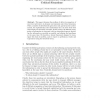Free Online Productivity Tools
i2Speak
i2Symbol
i2OCR
iTex2Img
iWeb2Print
iWeb2Shot
i2Type
iPdf2Split
iPdf2Merge
i2Bopomofo
i2Arabic
i2Style
i2Image
i2PDF
iLatex2Rtf
Sci2ools
DALT
2006
Springer
2006
Springer
When Agents Communicate Hypotheses in Critical Situations
This paper discusses the problem of efficient propagation of uncertain information in dynamic environments and critical situations. When a number of (distributed) agents have only partial access to information, the explanation(s) and conclusion(s) they can draw from their observations are inevitably uncertain. In this context, the efficient propagation of information is concerned with two interrelated aspects: spreading the information as quickly as possible, and refining the hypotheses at the same time. We describe a formal framework designed to investigate this class of problem, and we report on preliminary results and experiments using the described theory.
Critical Situations | DALT 2006 | Efficient Propagation | Intelligent Agents | Uncertain Information |
Related Content
| Added | 22 Aug 2010 |
| Updated | 22 Aug 2010 |
| Type | Conference |
| Year | 2006 |
| Where | DALT |
| Authors | Gauvain Bourgne, Nicolas Maudet, Suzanne Pinson |
Comments (0)

